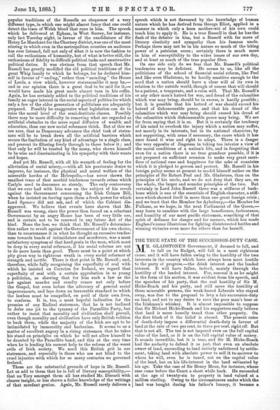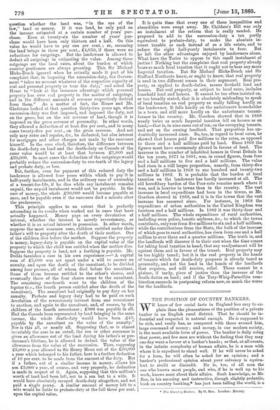THE TRUE STATE OF THE SUCCESSION-DUTY CASE.
MR. GLADSTONE'S Government, if doomed to fall, and to fall on its Budget, will fall in a most righteous cause, and it will have fallen owing to the hostility of the two interests in the country which have always been most hostile to the party of progress,—the drink interest and the landed interest. It will have fallen, indeed, mainly through the hostility of the landed interest. For, conceal it as he might in the form of his motion, it was evident from his speech, and the speeches of his party, that the real hostility of Sir M. Hicks-Beach and his party, and still more the hostility of those miserable persons, the weak-kneed Liberals who stayed away, was due to the proposal to levy a fair succession-duty on land, and not to any desire to save the poor man's beer or the Irishman's whiskey. It is almost impossible to suppose that Sir Michael Hicks-Beach and his supporters really believe that land is more heavily taxed than other property. On the first blush of it the belief is absurd. The present rates of death-duty impose a differential death-duty in favour of land at the rate of two per cent. to three per cent. right off. But that is not all. The tax is not imposed even on the full capital value of the land, as it is on the full capital value of money. It sounds incredible, but it is true, and Sir M. Hicks-Beach had the audacity to defend it as just, that even an absolute owner of land, succeeding to land entirely unfettered by settlement, taking land with absolute power to sell it to-morrow to whom he will, even he is taxed, not on the capital value of the land, but on his life-interest in the land estimated by his age. Take the case of Sir Henry Menx, for instance, whose case came before the Court a short while back. He succeeded at the age of twenty-six to property in land valued at a million sterling. Owing to the circumstances under which the land was bought during his father's lunacy, it became a
question whether the land was, "in the eye of the law," land or money. If it was land, he only paid on the income estimated at a certain number of years' purchase. Even at twenty-six the number of years' purchase would have been only thirteen and a half. On this value he would have to pay one per cent. ; or, assuming the land brings in three per cent., £4,050, if there were no reductions for outgoings. But the landowner is allowed to deduct all outgoings in estimating the value. Among those outgoings are the local rates, about the burden of which country gentlemen are always groaning. This Sir Michael Hicks-Beach ignored when he actually made it part of his complaint that, in imposing the succession-duty, the Government " takes no account whatever of the respective capacity of real and personal property to bear the duty," and asked the House to " look at the immense advantage which personal property has over real property in the matter of outgoings, and in the different amounts of revenue respectively derived from them." As a matter of fact, the House and Mr. Gladstone looked at that question thirty-two years ago, when succession-duty was first imposed, and imposed the duty, not on the gross, but on the net revenue of land, though it is imposed on the gross revenue of personalty. In other words, they allowed a deduction of at least five per cent., and in many cases twenty-five per cent., on the gross revenue. And not only may rates and repairs, &c., be deducted, but also interest for mortgages and other charges not made by the successor himself. In the case cited, therefore, the difference between the death-duty on land and the death-duty on Consols of the same value would be at least that between £3,800 and £30,000. In most cases the deduction of the outgoings would probably reduce the succession-duty to one-tenth of the legacy and probate duty, or less.
But, further, even for payment of this reduced duty the landowner is allowed four years within which to pay it in half-yearly instalments, and in the ordinary case of ownership of a tenant-for-life, if he dies while any instalment remains unpaid, the unpaid instalment would not be payable. In the case of money, the whole £30,000 would become payable at once, and be payable even if the successor died a minute after the predecessor.
This principle applies to an extent that is perfectly astounding in its results when worked out in cases that have actually happened. Money pays on every devolution of interest, whether the interest is merely reversionary, or whether it is an actual interest in possession. In other words, suppose the most common case, children entitled under their father's will to property after the death of their mother. One of the children dies before the mother. Suppose the property is money, legacy-duty is payable on the capital value of the property to which the child was entitled when the mother dies. Suppose the property is land, not a farthing is payable. Mr. Dodds furnishes a case in his own experience :—" A capital sum of £5,000 was set apart under a will to answer an annuity, and upon the death of the annuitant, to be divided among four persons, all of whom died before the annuitant. Some of them became entitled to the other's shares, and eventually three of the four shares came to the annuitant. The remaining one-fourth went to the children of the legatee V.e., the fourth person entitled after the death of the annuitant). The annuitant had originally to pay duty on her annuity. Probate and legacy duty had to be paid on each devolution of the reversionary interest from one reversioner to another, and again to the annuitant, and, of course, by the children of the fourth reversioner ; £800 was payable in all. Had the Consols been represented by land bringing in the same income, the whole death-duty would have been £46, payable by the annuitant on the value of the annuity." Nor is this all, or nearly all. Supposing that, as is almost invariably the case in an entail, the son or other successor is given an allowance out of the land during his father's or predecessor's lifetime, he is allowed to deduct the value of the allowance from the value of the succession. Thus, supposing £3,000 a year allowed to Sir Henry Meux out of the £30,000 a year which belonged to his father, here is a further deduction of 10 per cent. to be made from the amount of the duty. But if a father, out of a similar income in money, allows his son £3,000 a year, of course, and very properly, no deduction is made in respect of it. Again, supposing that this million's worth of land had been left, not to a son but to a wife. It would have absolutely escaped death-duty altogether, and not paid a single penny. A similar amount of money left to a wife would be liable to probate-duty at the full three per cent. upon the capital value. It is quite time that every one of these inequalities and absurdities were swept away. Mr. Childers's Bill was only an instalment of the reform that is really needed. He proposed to add to the succession-duty a tax partly equivalent to probate-duty, to make the absolute interest taxable as such instead of as a life estate, and to reduce the eight half-yearly instalments to four. But he left the other advantages enjoyed by landowners alone. What have the Tories to oppose to this small instalment of justice ? Nothing but the complaint that real property already bears so much local taxation that it ought not to bear any more Imperial taxation. But Sir Michael Hicks-Beach and Sir Stafford Northcote know, or ought to know, that real property is used in two different senses in their argument. Real property, as applied to death-duties, means freehold land and houses. But real property, as subject to local rates, includes leasehold land and houses. It cannot be too often insisted on, or too broadly stated, that it is absolutely misleading to speak of local taxation on real property as really falling hardly on the landowner. It falls hardly on the unfortunate householder in a town, and still more hardly on the unfortunate tenantfarmer in the country. Mr. Goschen showed that in 1868 nearly twice as much Imperial taxation fell on houses as on land,—that is, in nine cases out of ten, on the occupying tenants, and not on the owning landlord. That proportion has undoubtedly increased since. So, too, in regard to local rates, he showed that houses paid five millions to the rates, as opposed to three and a half millions paid by land. Since 1868 the figures must have enormously altered in favour of land. The increase in the number of inhabited houses in Great Britain in the ten years, 1871 to 1881, was, in round figures, from four and a half millions to five and a half millions. The value had risen in a still larger proportion, namely, from thirty-five and a half millions in 1868 to one hundred and twenty-two millions in 1882. It is probable that the burden of local taxation on the landowner has hardly increased at all. The old hereditary burden of the Poor-rate remains much where it was, and is heavier in towns than in the country. The vast increase in local expenditure had been in the towns, as Mr. Goschen showed in 1868, and it is in the towns that the vast increase has occurred since. For instance, in 1868 the expenditure of urban authorities in the United Kingdom was fourteen and a half millions. In 1882 it was thirty-four and a half millions. The whole expenditure of rural authorities, including even police, lunatic asylums, &c., to which the towns contribute, only rose from five millions to six and a half millions, while the contributions from the State, the bulk of the increase of which goes to rural authorities, has risen from one and a half million to over three and a quarter millions. The truth is, and the landlords will discover it to their cost when the time comes for taking local taxation in hand, that any readjustment will be against them and in favour of the tenant. Real property may be too highly taxed ; but it is the real property in the hands of tenants which for death-duty purposes is already taxed as personalty, and not the land in the hands of the landlords that requires, and will receive, relief. There cannot be a plainer, if tardy, piece of justice than the increase of the death-duties on land ; and if the Tory-Whig-Parnellite combination succeeds in postponing reform now, so much the worse for the landlords.



































 Previous page
Previous page